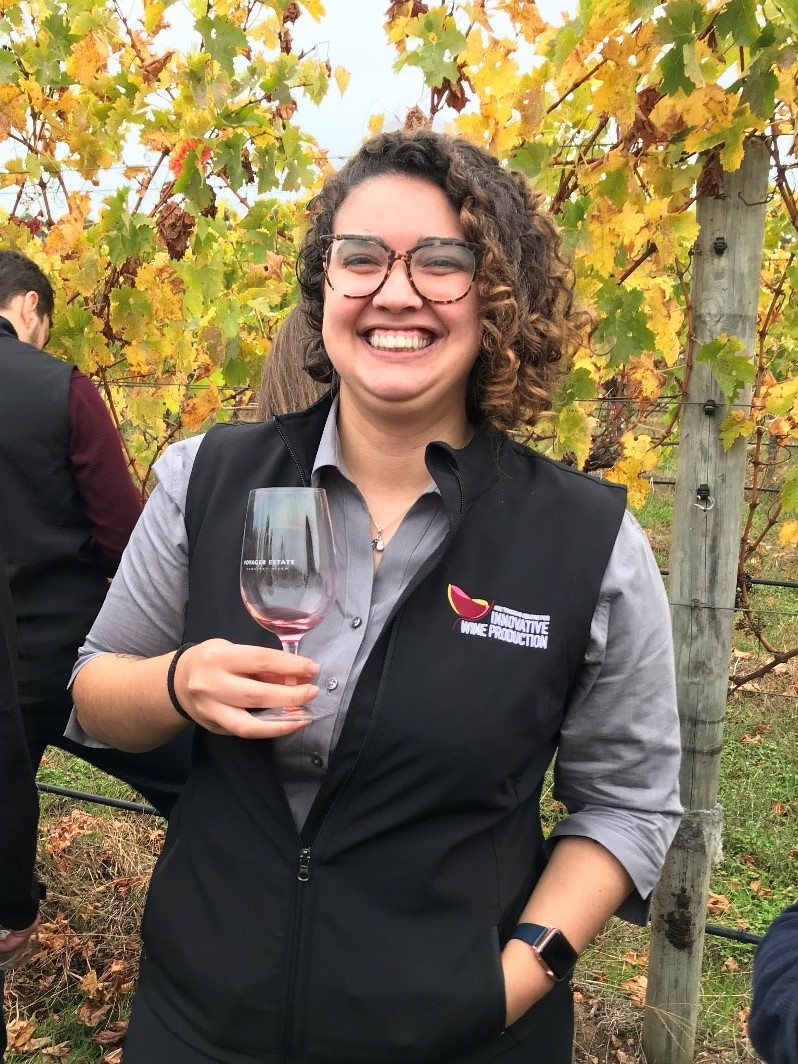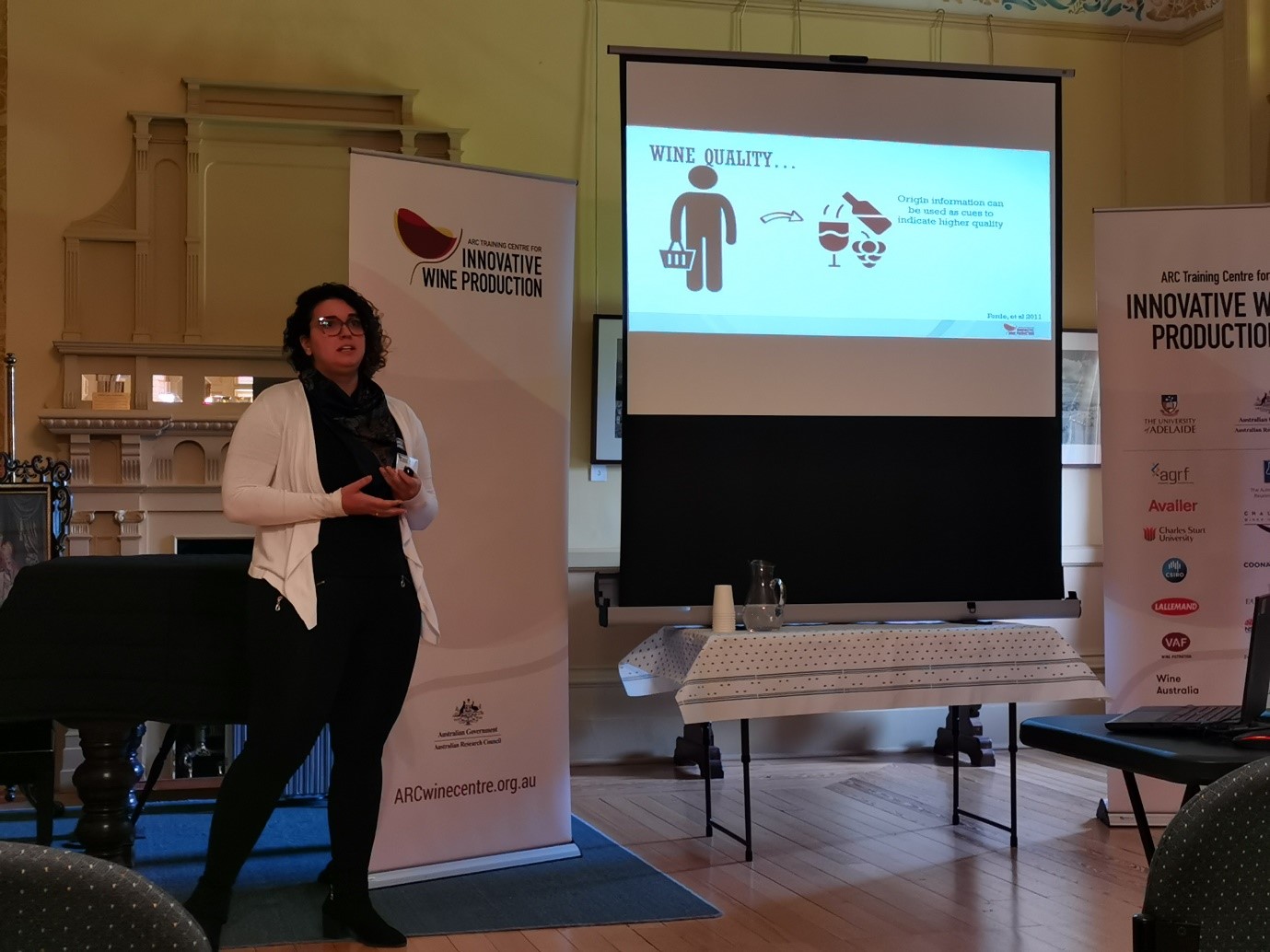
Lira Souza Gonzaga enjoys a wine tasting in a Voyager Estate vineyard. Margaret River, WA, 2019.
It is with great pleasure we announce and congratulate Lira Souza Gonzaga who will soon be awarded a PhD from the University of Adelaide for her thesis titled Sensory Characterisation of Australian Cabernet Sauvignon Wine Typicity. The external examiners who reviewed Lira’s thesis recommended she be awarded a PhD unconditionally!
Lira will be the first student from the current Australian Research Council Training Centre for Innovative Wine Production (ARC TC-IWP) to qualify for the award.
Lira joined the Centre in July 2018 after completing a Bachelor in Food Engineering at the Universidade Federal de Lavras in Lavras, Brazil. Starting as a Master of Philosophy (MPhil) candidate, due to excellent progress Lira was awarded an upgrade to a PhD in June 2020 to extend the scope of her research.
“Lira has always impressed me with her ambition and goal setting, which along with her intellectual and personal qualities, have enabled her to make excellent progress with her research in a relatively short period of time.”
Lira’s principal supervisor, Associate Professor David Jeffery of The University of Adelaide
“Lira’s work was innovative and used different sensory methodologies with experts, trained panellists, and consumers to explore a range of aspects related to the definition of regional sensory characters of Cabernet Sauvignon wines, with a focus on those from Coonawarra,” said David.
This research has so far resulted in three peer reviewed publications with Lira as lead author:
-
- A review article titled Defining wine typicity: sensory characterisation and consumer perspectives, was published in the Australian Journal of Grape and Wine Research as part of an ARC Training Centre for Innovative Wine Production Special Issue.
- A research article titled Using content analysis to characterise the sensory typicity and quality judgements of Australian Cabernet Sauvignon wines, published in the journal Foods (2019). This research compared > 2,500 expert wine writers web based Cabernet Sauvignon reviews, to build regional sensory profiles. This was followed up with an expert panel who tasted 84 Cabernet Sauvignon wines from four regions, to analyse their sensory properties and assign quality scores for each wine. Information from the wine writers reviews and the expert panel determined the descriptors ‘floral’, ‘complexity’, ‘balanced’, ‘full body’ and ‘fine’ were commonly associated with silver and gold medal winning wines.
- A research article titled Sensory typicity of regional Australian Cabernet Sauvignon wines according to expert evaluations and descriptive analysis, published in Food Research International (2020). An expert panel of wine tasters was tasked with sorting the 84 Cabernet Sauvignon wines (unaware of where the wines were from) based on similar sensory properties. Several sensory drivers were identified to separate wines from different regions such as ‘mint’ and ‘dark fruits’ being important for Coonawarra wine profiles, ‘floral’ and ‘green pepper’ for Margaret River, ‘stemmy’ for Yarra Valley, and ‘barnyard’ and ‘savoury’ differentiating Bordeaux wines from the other regions. Descriptive analysis undertaken by trained panellists, on a subset of 52 wines, yielded agreement with the experts in relation to the sensory descriptors linked to the different wine regions.
“Doing this PhD was a life changing experience. It not only gave me a chance to move to Australia and fall in love with this country, but it also took me from being a humble university student to a professional researcher putting in practice everything that I have learnt.”
Lira Souza Gonzaga, The University of Adelaide

Lira Souza Gonzaga presents her latest research at a Centre workshop held at Urrbrae House in May 2019.
Throughout her time in the Centre, Lira has actively communicated her research and findings to the wine industry and other wine science researchers at a number of workshops and conferences, including the 2019 Australian Wine Industry Technical Conference, 2020 XVIII International Terroir Conference and 2021 Crush Symposium.
“I would not be here if it wasn’t for the amazing team that not only trusted me, but supported and encouraged me through this journey. I will forever be grateful to my supervisors Dave Jeffery, Sue Bastian, and Dimitra Capone. It was also great to be part of something bigger like the ARC TC-IWP, so I am immensely thankful for the support I was provided,” Lira said.
Lira’s research findings, in conjunction with others from the project team, may enable grape growers and winemakers to develop practices that can specifically alter grape and wine composition to develop targeted and desirable wine styles with higher value.
Lira is using the knowledge and skills developed through her PhD in her current role as Research Associate at the University of Adelaide, where she is working on a project investigating the characteristics of Barossa Valley terroir expressed in the sensory profiles of Shiraz wines.
The Centre wishes Lira all the best for her future and looks forward to continuing to work with her in her current role.
Lira was awarded a scholarship by the Australian Research Council Training Centre for Innovative Wine Production with supplementary scholarships from the School of Agriculture, Food and Wine at the University of Adelaide and Wine Australia (WA Ph1804). Lira’s research was generously supported by the Centre’s industry partners Coonawarra Grape & Wine Incorporated and CSIRO as well as the University of Adelaide.
The ARC Training Centre for Innovative Wine Production is funded by the Australian Government through the Australian Research Council’s Industrial Transformation Research Program (project IC170100008), the University of Adelaide and research and industry partners.
